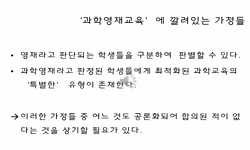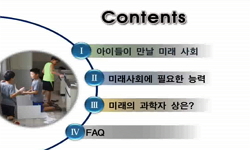본 연구에서는 영재학생들과 일반학생들이 과학학습 상황에서 경험하는 성취와 관련된 학습정서를 비교해보고 영재학생들의 긍정적 성취정서 형성 요인을 확인해보고자 하였다. 그 결과 ...
http://chineseinput.net/에서 pinyin(병음)방식으로 중국어를 변환할 수 있습니다.
변환된 중국어를 복사하여 사용하시면 됩니다.
- 中文 을 입력하시려면 zhongwen을 입력하시고 space를누르시면됩니다.
- 北京 을 입력하시려면 beijing을 입력하시고 space를 누르시면 됩니다.
https://www.riss.kr/link?id=A100318042
- 저자
- 발행기관
- 학술지명
- 권호사항
-
발행연도
2015
-
작성언어
Korean
- 주제어
-
KDC
379
-
등재정보
KCI등재
-
자료형태
학술저널
- 발행기관 URL
-
수록면
139-159(21쪽)
-
KCI 피인용횟수
6
- 제공처
-
0
상세조회 -
0
다운로드
부가정보
국문 초록 (Abstract)
본 연구에서는 영재학생들과 일반학생들이 과학학습 상황에서 경험하는 성취와 관련된 학습정서를 비교해보고 영재학생들의 긍정적 성취정서 형성 요인을 확인해보고자 하였다. 그 결과 수업상황, 학습상황, 시험상황 각각 8개 요소 모두에서 각 그룹별 유의미한 차이를 볼 수 있었다. 영재학생들은 일반학생들보다 높은 긍정적 성취정서를 가지고 있으며 반면에 화, 불안, 수치심, 절망감, 지루함과 같은 부정적 성취정서는 일반학생들보다 더 낮게 형성되어 있음을 확인하였다. 이러한 영재학생들의 성취정서가 어떤 요인에 의해 형성되었는지 확인하기 위하여 서술식 설문을 실시하였고 결과를 학습과제, 학생, 교사 요인으로 분류하였다. 영재학생들의 긍정적 성취정서의 형성은 과학 학습을 매우 가치 있는 활동으로 평가하고 있으며, 실험수업을 즐기고 긍정적인 평가경험을 가지고 있는 것에 기인하였음을 알 수 있었다. 그리고 적극적인 학습 태도와 과학에 대해 기존에 가지고 있던 관심과 지식, 긍정적인 자아 인식, 진로와의 연관성 그리고 교사의 흥미유도와 칭찬 등에 의해 영향을 받고 있음을 확인하였다. 이를 반영하여 학생들이 과학과목에 대한 부정적 성취정서를 줄이고 긍정적 성취정서를 확대하는 방안이 마련되기를 바란다
다국어 초록 (Multilingual Abstract)
In this study, achievement emotions were compared between the gifted and regular students. The significant differences for each group were shown in all eight elements respectively in lesson situation, learning situation and test situation. Among vario...
In this study, achievement emotions were compared between the gifted and regular students. The significant differences for each group were shown in all eight elements respectively in lesson situation, learning situation and test situation. Among various achievement emotions, it was also found that the gifted students showed higher level of positive achiecement emotions. Furthermore, positive achievement emotions can have positive effects in increasing the achievement level in science subject. On the other hand, the negative achievement emotions were higher for ordinary students that could have negative effets. The influential factors were recognizing the values of Science, Science experiments, positive evaluation experiences, aggressive learning attitudes, interests and knowledge, positive self-perceptions, career relationships, and teachers' recognitions. These factors influenced in imcreasing students' positive achievement emotions and decreasing negative achievement emotions. By conducting in-depth advanced conversations with students based on the above results could increase students' interest and positive achievement emotions
참고문헌 (Reference)
1 전지영, "한국 중학생의 과학영역 성취정서 질문지(AEQ-KMS) 개발과 타당화" 한국과학교육학회 34 (34): 745-754, 2014
2 김수겸, "중학교 과학영재 학생과 일반학생의 직업가치관과 과학 진로지향도 비교" 한국과학교육학회 32 (32): 1222-1240, 2012
3 양명희, "정서조절이 학습전략에 미치는 영향: 정서를 매개로 하는 관계 검증" 한국교육심리학회 24 (24): 449-467, 2010
4 도승이, "정서와 교수-학습 연구의 쟁점과 전망" 한국교육심리학회 22 (22): 919-937, 2008
5 James, W. K., "정서심리학" 센게이지러닝코리아 2012
6 김은진, "우리나라 학생들이 경험하는 학업상황의 정서 연구" 한국교육심리학회 25 (25): 501-521, 2011
7 이지현, "실험실습법에 의한 수행평가가 중학생의 과학성취도 및 정의적 영역에 미치는 영향" 한국과학교육학회 23 (23): 66-74, 2003
8 김지영, "사회적 상호작용을 강조한 과학 탐구실혐의 효과" 한국과학교육학회 22 (22): 757-767, 2002
9 조지민, "국제 학업성취도 평가 결과에 기반한 교육정책 개선 방안" 한국교육과정평가원 2012
10 한기순, "과학영재의 과학문제발견력 관련변인에 대한 구조방정식모형 분석: 과학관련태도와 동기 및 자기조절 학습전략을 중심으로" 한국영재학회 18 (18): 23-52, 2008
1 전지영, "한국 중학생의 과학영역 성취정서 질문지(AEQ-KMS) 개발과 타당화" 한국과학교육학회 34 (34): 745-754, 2014
2 김수겸, "중학교 과학영재 학생과 일반학생의 직업가치관과 과학 진로지향도 비교" 한국과학교육학회 32 (32): 1222-1240, 2012
3 양명희, "정서조절이 학습전략에 미치는 영향: 정서를 매개로 하는 관계 검증" 한국교육심리학회 24 (24): 449-467, 2010
4 도승이, "정서와 교수-학습 연구의 쟁점과 전망" 한국교육심리학회 22 (22): 919-937, 2008
5 James, W. K., "정서심리학" 센게이지러닝코리아 2012
6 김은진, "우리나라 학생들이 경험하는 학업상황의 정서 연구" 한국교육심리학회 25 (25): 501-521, 2011
7 이지현, "실험실습법에 의한 수행평가가 중학생의 과학성취도 및 정의적 영역에 미치는 영향" 한국과학교육학회 23 (23): 66-74, 2003
8 김지영, "사회적 상호작용을 강조한 과학 탐구실혐의 효과" 한국과학교육학회 22 (22): 757-767, 2002
9 조지민, "국제 학업성취도 평가 결과에 기반한 교육정책 개선 방안" 한국교육과정평가원 2012
10 한기순, "과학영재의 과학문제발견력 관련변인에 대한 구조방정식모형 분석: 과학관련태도와 동기 및 자기조절 학습전략을 중심으로" 한국영재학회 18 (18): 23-52, 2008
11 Kleine, M., "The structure of students' emotions experienced during a mathematical achievement test" 37 (37): 221-225, 2005
12 Pekrun, R., "The self-concept. European perspectives on its development, aspects, and applications" Springer 107-119, 1990
13 Turner, J. E., "The important of student's goals in their emotional experience of academic failure : Investigating the precursors and consequences of shame" 37 (37): 79-89, 2002
14 Pekrun, R., "The control-value theory of achievemant emotion : Assumption, corollaries, and implications for educational research and practice" 18 : 315-341, 2006
15 Murdock, T. B., "Teachers as sources of middle school students' motivational identity: Variable-centered and person-centered analytic approaches" 103 (103): 383-399, 2003
16 Isen, A. M., "Some perspectives on Positive Affect and Self-Regulation" 11 : 184-187, 2000
17 Zimmerman, B. J., "Self-motivation for academic attainment : The role of self-efficacy beliefs and personal goal setting" 29 (29): 663-676, 1992
18 노국향, "PISA 2000 평가결과 분석 연구" 한국교육과정평가원 219-, 2001
19 이미경, "OECD/PISA 평가틀 및 공개문항 분석 - PISA 2000, PISA 2003, PISA 2006 공개문항 -" 한국교육과정평가원 2007
20 Pekrun, R., "Motivational psychology of human development" Elsevier 143-163, 2000
21 Linnenbrink, E. A., "Motivation, affect, and cognitive processing: What role does affect play?" 2003
22 Pekrun, R., "Measuring emotion in student’s learning and performance : The Achievement Emotions Questionnaire(AEQ)" 36 : 36-48, 2011
23 Plutchik, R., "Emotions and life: Perspectives from psychology, biology, and evolution" American Psychological Association 2003
24 Efklides, A., "Emotional experiences during learning: Multiple, situated and dynamic" 15 (15): 377-380, 2005
25 Grieder, S., "Emotional Facets of Self-Regulated Learning in a Longitudinal Study"
26 Linnenbrink, E. A., "Emotion research in education : Theoretical and methodological perspectives on the integration of affect, motivation, and cognition" 18 : 307-314, 2006
27 Pekrun, R., "Emotion in education" Academic Press 13-36, 2007
28 Linnenbrink, E. A., "Emotion in Education" Elsevier Inc 107-124, 2007
29 Boekaerts, M., "Emotion in Education" Elsevier Inc 37-56, 2007
30 Meyer, D. K., "Discovering emotion in classroom motivation research" 37 (37): 107-114, 2002
31 Schunk, D. H., "Developing children's self-efficacy and skills; The roles of social comparative information and goal setting" 8 : 76-86, 1983
32 Kuklinski, M. R., "Classroom and developmental differences in a path model of teacher expectancy effects" 72 (72): 1554-1578, 2001
33 Pekrun, R., "Achievement goals and discrete achievement emotions : A Theoretical model and prospective test" 98 (98): 583-597, 2006
34 Pekrun, R., "Achievement goals and achievement emotions : Testing a model of their joint relations with academic performance" 101 (101): 115-135, 2009
35 Linnenbrink, E. A., "Achievement goal theory and affect : Anasymmetrical bidirectional model" 37 : 69-78, 2002
36 Pekrun, R., "Academic emotions in students’self-regulated learning and achievement : A program of qualitative and quantitative research" 37 (37): 91-105, 2002
동일학술지(권/호) 다른 논문
-
소속 학교급과 영재교육 경험에 따른 집단적 교수효능감 및 융합교육 장애요인에 대한 교사인식
- 韓國英才學會
- 이미순
- 2015
- KCI등재
-
- 韓國英才學會
- 정덕호
- 2015
- KCI등재
-
- 韓國英才學會
- 조은별
- 2015
- KCI등재
-
- 韓國英才學會
- 박미진
- 2015
- KCI등재
분석정보
인용정보 인용지수 설명보기
학술지 이력
| 연월일 | 이력구분 | 이력상세 | 등재구분 |
|---|---|---|---|
| 2022 | 평가예정 | 재인증평가 신청대상 (재인증) | |
| 2019-01-01 | 평가 | 등재학술지 유지 (계속평가) |  |
| 2016-01-01 | 평가 | 등재학술지 유지 (계속평가) |  |
| 2012-01-01 | 평가 | 등재학술지 유지 (등재유지) |  |
| 2009-01-01 | 평가 | 등재학술지 선정 (등재후보2차) |  |
| 2008-01-01 | 평가 | 등재후보 1차 PASS (등재후보1차) |  |
| 2006-01-01 | 평가 | 등재후보학술지 선정 (신규평가) |  |
학술지 인용정보
| 기준연도 | WOS-KCI 통합IF(2년) | KCIF(2년) | KCIF(3년) |
|---|---|---|---|
| 2016 | 1.47 | 1.47 | 1.26 |
| KCIF(4년) | KCIF(5년) | 중심성지수(3년) | 즉시성지수 |
| 1.29 | 1.29 | 1.961 | 0.28 |





 RISS
RISS DBpia
DBpia






